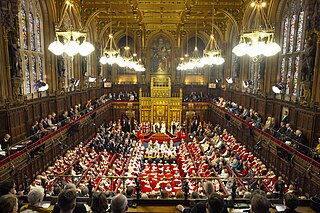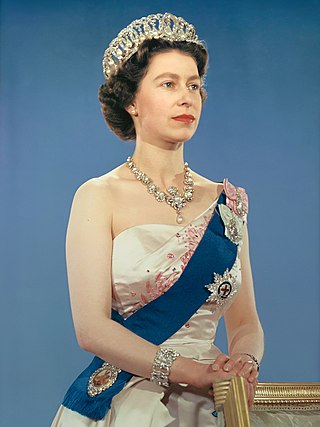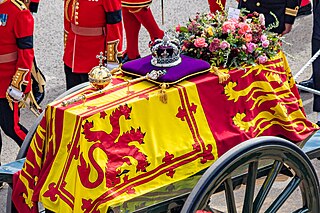
Buckingham Palace is a royal residence in London, and the administrative headquarters of the monarch of the United Kingdom. Located in the City of Westminster, the palace is often at the centre of state occasions and royal hospitality. It has been a focal point for the British people at times of national rejoicing and mourning.

Balmoral Castle is a large estate house in Aberdeenshire, Scotland, and a residence of the British royal family. It is near the village of Crathie, 9 miles (14 km) west of Ballater and 50 miles (80 km) west of Aberdeen.

His Majesty's Most Honourable Privy Council is a formal body of advisers to the sovereign of the United Kingdom. Its members, known as privy counsellors, are mainly senior politicians who are current or former members of either the House of Commons or the House of Lords.

The monarchy of the United Kingdom, commonly referred to as the British monarchy, is the constitutional form of government by which a hereditary sovereign reigns as the head of state of the United Kingdom, the Crown Dependencies and the British Overseas Territories. The current monarch is King Charles III, who ascended the throne on 8 September 2022, upon the death of his mother, Queen Elizabeth II.

The Lord Chancellor, formally titled Lord High Chancellor of Great Britain, is the highest-ranking traditional minister among the Great Officers of State in Scotland and England in the United Kingdom, nominally outranking the prime minister. The lord chancellor is appointed by the sovereign on the advice of the prime minister. Prior to the union of England and Scotland into the Kingdom of Great Britain, there were separate lord chancellors for the Kingdom of England and the Kingdom of Scotland. There were Lord Chancellors of Ireland until 1922.

The president of the Board of Trade is head of the Board of Trade. A committee of the Privy Council of the United Kingdom, it was first established as a temporary committee of inquiry in the 17th century, that evolved gradually into a government department with a diverse range of functions. The current holder of the post is Kemi Badenoch, who is concurrently the secretary of state for business and trade.

The State Opening of Parliament is a ceremonial event which formally marks the beginning of each session of the Parliament of the United Kingdom. At its core is His Majesty's "gracious speech from the throne", which is read by the monarch but written by HM Government. In the speech the monarch gives notice of forthcoming state visits, before setting out the government's legislative programme for the new parliamentary session. No business of either House of Parliament can proceed until the Sovereign’s speech has been delivered.

The King's Privy Council for Canada, sometimes called His Majesty's Privy Council for Canada or simply the Privy Council (PC), is the full group of personal consultants to the monarch of Canada on state and constitutional affairs. Practically, the tenets of responsible government require the sovereign or his viceroy, the governor general of Canada, to almost always follow only that advice tendered by the Cabinet: a committee within the Privy Council composed usually of elected members of Parliament. Those summoned to the KPC are appointed for life by the governor general on the advice of the prime minister of Canada, meaning that the group is composed predominantly of former Cabinet ministers, with some others having been inducted as an honorary gesture. Those in the council are accorded the use of an honorific style and post-nominal letters, as well as various signifiers of precedence.

A throne room or throne hall is the room, often rather a hall, in the official residence of the crown, either a palace or a fortified castle, where the throne of a senior figure is set up with elaborate pomp—usually raised, often with steps, and under a canopy, both of which are part of the original notion of the Greek word thronos.
Investiture is a formal installation or ceremony that a person undergoes, often related to membership in Christian religious institutes as well as Christian knighthoods or damehoods, in addition to government offices.
Paul Kevin Whybrew, is a British former member of staff to the Royal Households of the United Kingdom. He served as Page of the Backstairs to Queen Elizabeth II until her death on 8 September 2022.

The monarchy of Jamaica is a system of government in which a hereditary monarch is the sovereign and head of state of Jamaica. The current Jamaican monarch and head of state, since 8 September 2022, is King Charles III. As sovereign, he is the personal embodiment of the Jamaican Crown. Although the person of the sovereign is equally shared with 14 other independent countries within the Commonwealth of Nations, each country's monarchy is separate and legally distinct. As a result, the current monarch is officially titled King of Jamaica and, in this capacity, he and other members of the royal family undertake public and private functions domestically and abroad as representatives of the Jamaican state. However, the monarch is the only member of the royal family with any constitutional role.

Elizabeth II was Queen of the United Kingdom and other Commonwealth realms from 6 February 1952 until her death in 2022. She was queen regnant of 32 sovereign states over the course of her lifetime and remained the monarch of 15 realms by the time of her death. Her reign of over 70 years is the longest of any British monarch, the longest of any female monarch, and the second longest verified reign of any monarch of a sovereign state in history.

The coronation of Elizabeth II as queen of the United Kingdom and the other Commonwealth realms took place on 2 June 1953 at Westminster Abbey in London. She acceded to the throne at the age of 25 upon the death of her father, George VI, on 6 February 1952, being proclaimed queen by her privy and executive councils shortly afterwards. The coronation was held more than one year later because of the tradition of allowing an appropriate length of time to pass after a monarch dies. It also gave the planning committees adequate time to make preparations for the ceremony. During the service, Elizabeth took an oath, was anointed with holy oil, was invested with robes and regalia, and was crowned Queen of the United Kingdom, Canada, Australia, New Zealand, South Africa, Pakistan, and Ceylon.

In the United Kingdom, state funerals are usually reserved for monarchs. The most recent was the state funeral of Queen Elizabeth II on 19 September 2022.

Monarchy: The Royal Family at Work is a fly on the wall documentary TV series made by the BBC and RDF Media which follows the British Royal Family over the course of a year.
Operation London Bridge was the funeral plan for Queen Elizabeth II. The plan included the announcement of her death, the period of official mourning, and the details of her state funeral. The plan was created as early as the 1960s and revised many times in the years before her death in September 2022.

State and official visits to the United Kingdom are formal visits by the head of state of one country to the United Kingdom, during which the British Sovereign acts as official host of the visitor. It is a royal event that involves all the assets in the Civil Service, the Royal Household and the Household Division. It also involves other members of the Royal family and is centred in London, the national capital. Invitations for state visits are sent by the Royal Household with supervision by the Foreign and Commonwealth Office.
A list of events relating to politics and government in the United Kingdom during 2022.

Elizabeth II, Queen of the United Kingdom and the other Commonwealth realms, died on 8 September 2022 at Balmoral Castle in Scotland, at the age of 96. Elizabeth's reign of 70 years and 214 days was the longest of any British monarch. She was succeeded by her eldest son, Charles III.















